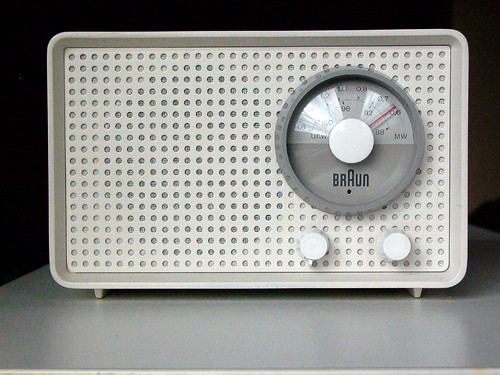Radio Motion Meditation
26 May 2010, by Ted[caption id="" align="alignright" width="307" caption="Via Flickr User Nite_Owel"] [/caption]
[/caption]
A version of this essay appears at Everyday Ichiro
In a previous post, I talked about sports talk radio. Now, it's onto the good side of baseball on the radio: the game broadcasts.
I listened to a good part of Sunday's Mariners game against the Padres on the radio while driving home from a camping trip with my wife and a group of friends. That I listened on the radio is notable because it was the first time that I have done so all season. Until then, in an attempt to observe and report as much as I could of the Mariners, in the kind of detail that is only possible through TV, I had ridden my DVR like a jockey. The radio, well I left it in the figurative closet, like an antique attache case, made of the kind of old leather that smells like the recliner in your grandparents' living room that you used to fall asleep in.
Like that leather attache case, baseball on the radio these days requires some back story to be truly appreciated.
My history with the Mariners is only a month or so deep. As such, I've got very little back story. At the beginning of the season, I had nothing to go on but some spring training games. I turned to TV broadcasts to cull Mariners knowledge through my eyeballs. Ichiro's batting stance, King Felix's mechanics and pitch movement, Guti's glovework near the wall, and so on. I'm all for using my imagination, but I would have been out of my comfort zone listening to games about players I hadn't watched play.
Also, I wanted to see how each player carried himself, and what their general presentation was.* Radio, for all of its charms and enchantments, can't feed my eyeballs with that information. Instead it consists of the limited storytelling scope of one or two observers. They're hard-working observers, without a doubt, but they're constrained by the limitations of their medium. Not to say that TV doesn't also face myriad constraints, but I think it's safe to say that many more of the senses are stimulated when you watch TV. There's basically a radio broadcast laid over the constant stream of images, so everything TV-wise is an add-on from the foundations of the radio broadcast. Humankind and its social interactions and judgments leaped forward on the shoulders of speech and storytelling, but we're still rooted in faces and bodies, postures and poses, and that's what TV offers.
*It's also true that Mariners fans also had to learn about their own players, like newcomers Casey Kotchman and Cliff Lee, for example, who they might not have watched play for more than a few games previously.
[caption id="" align="alignleft" width="368" caption="Via Flickr user abardwell"] [/caption]
[/caption]
Granted, I'm discounting the great possibilities of the human imagination, replacing wonder with concrete data. It's the book vs. movie problem, in essence, ie. that I can't read a Harry Potter book anymore without envisioning the actors who played them in the movie series. I saw the movies before I read the books, so now I will never know what my brain would have come up with if I had read them first. I will also never know what it's like to imagine the Mariners via the descriptions of Dave Niehaus. But really baseball isn't about imagination as much as it is about the wonder of actual things. Every day you'll see something new, yes, but you'll see something new that is real. The play of the imagination isn't in the tension of real vs. fantastic, but of the magic of every day life, of Every Day Ichiro.
That being said, radio does have its mystical properties. It was with some nostalgic pleasure that I found the game on the radio while driving home from a weekend away. Not only was this the first broadcast I heard on the year, but there isn't a better way to end a camping trip or to spend an hour on the road than with live baseball on the radio. It's the middle ground between the country and the city, a bridge from our pastoral roots to the urban present.
So I turned up Dave Niehaus piping through on 710 AM, I draped an arm out the window, and I tuned out.
I didn't literally tune out, like out of life. I kept an eye on the road and all, and at the very least I wasn't texting and driving. But instead of zeroing in on the details of the Mariners game, on every pitch, I let my mind wander in between the phrasings, and the pure sounds of a man telling a story of a game happening somewhere distant. The radio game was the backdrop, the hazy middle distance seen from the path that my thoughts wandered, rarely settling anywhere but walking, step after step, in the directionless direction of a figurative destination, the highway emerging a few car lengths ahead and crumbling away behind me. Driving the pace of my ranging thoughts: the game itself, pitch after pitch ringing in the subconscious like a heartbeat.
The radio, humming along like time and the storyteller before the fire, sets a beat to life rather than recreating the world the way that TV does. So maybe I was wrong. I didn't need to know anything about the Mariners that the radio couldn't provide, because the voice in the radio doesn't offer information as much as it does forward motion. A sense of progress, through time, through life, down the highway, on the way home.

